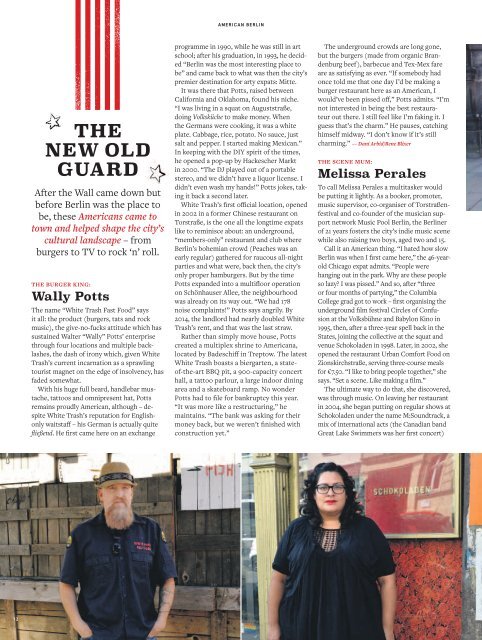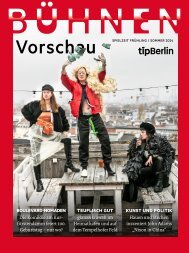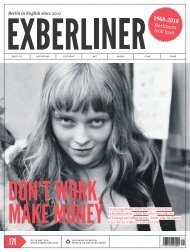EXBERLINER Issue 153, October 2016
Create successful ePaper yourself
Turn your PDF publications into a flip-book with our unique Google optimized e-Paper software.
AMERICAN BERLIN<br />
THE<br />
NEW OLD<br />
GUARD<br />
After the Wall came down but<br />
before Berlin was the place to<br />
be, these Americans came to<br />
town and helped shape the city’s<br />
cultural landscape – from<br />
burgers to TV to rock ‘n’ roll.<br />
THE BURGER KING:<br />
Wally Potts<br />
The name “White Trash Fast Food” says<br />
it all: the product (burgers, tats and rock<br />
music), the give-no-fucks attitude which has<br />
sustained Walter “Wally” Potts’ enterprise<br />
through four locations and multiple backlashes,<br />
the dash of irony which, given White<br />
Trash’s current incarnation as a sprawling<br />
tourist magnet on the edge of insolvency, has<br />
faded somewhat.<br />
With his huge full beard, handlebar mustache,<br />
tattoos and omnipresent hat, Potts<br />
remains proudly American, although – despite<br />
White Trash’s reputation for Englishonly<br />
waitstaff – his German is actually quite<br />
fließend. He first came here on an exchange<br />
programme in 1990, while he was still in art<br />
school; after his graduation, in 1993, he decided<br />
“Berlin was the most interesting place to<br />
be” and came back to what was then the city’s<br />
premier destination for arty expats: Mitte.<br />
It was there that Potts, raised between<br />
California and Oklahoma, found his niche.<br />
“I was living in a squat on Auguststraße,<br />
doing Volksküche to make money. When<br />
the Germans were cooking, it was a white<br />
plate. Cabbage, rice, potato. No sauce, just<br />
salt and pepper. I started making Mexican.”<br />
In keeping with the DIY spirit of the times,<br />
he opened a pop-up by Hackescher Markt<br />
in 2000. “The DJ played out of a portable<br />
stereo, and we didn’t have a liquor license. I<br />
didn’t even wash my hands!” Potts jokes, taking<br />
it back a second later.<br />
White Trash’s first official location, opened<br />
in 2002 in a former Chinese restaurant on<br />
Torstraße, is the one all the longtime expats<br />
like to reminisce about: an underground,<br />
“members-only” restaurant and club where<br />
Berlin’s bohemian crowd (Peaches was an<br />
early regular) gathered for raucous all-night<br />
parties and what were, back then, the city’s<br />
only proper hamburgers. But by the time<br />
Potts expanded into a multifloor operation<br />
on Schönhauser Allee, the neighbourhood<br />
was already on its way out. “We had 178<br />
noise complaints!” Potts says angrily. By<br />
2014, the landlord had nearly doubled White<br />
Trash’s rent, and that was the last straw.<br />
Rather than simply move house, Potts<br />
created a multiplex shrine to Americana,<br />
located by Badeschiff in Treptow. The latest<br />
White Trash boasts a biergarten, a stateof-the-art<br />
BBQ pit, a 900-capacity concert<br />
hall, a tattoo parlour, a large indoor dining<br />
area and a skateboard ramp. No wonder<br />
Potts had to file for bankruptcy this year.<br />
“It was more like a restructuring,” he<br />
maintains. “The bank was asking for their<br />
money back, but we weren’t finished with<br />
construction yet.”<br />
The underground crowds are long gone,<br />
but the burgers (made from organic Brandenburg<br />
beef), barbecue and Tex-Mex fare<br />
are as satisfying as ever. “If somebody had<br />
once told me that one day I’d be making a<br />
burger restaurant here as an American, I<br />
would’ve been pissed off,” Potts admits. “I’m<br />
not interested in being the best restaurateur<br />
out there. I still feel like I’m faking it. I<br />
guess that’s the charm.” He pauses, catching<br />
himself midway. “I don’t know if it’s still<br />
charming.” — Dani Arbid/Rene Blixer<br />
THE SCENE MUM:<br />
Melissa Perales<br />
To call Melissa Perales a multitasker would<br />
be putting it lightly. As a booker, promoter,<br />
music supervisor, co-organiser of Torstraßenfestival<br />
and co-founder of the musician support<br />
network Music Pool Berlin, the Berliner<br />
of 21 years fosters the city’s indie music scene<br />
while also raising two boys, aged two and 15.<br />
Call it an American thing. “I hated how slow<br />
Berlin was when I first came here,” the 46-yearold<br />
Chicago expat admits. “People were<br />
hanging out in the park. Why are these people<br />
so lazy? I was pissed.” And so, after “three<br />
or four months of partying,” the Columbia<br />
College grad got to work – first organising the<br />
underground film festival Circles of Confusion<br />
at the Volksbühne and Babylon Kino in<br />
1995, then, after a three-year spell back in the<br />
States, joining the collective at the squat and<br />
venue Schokoladen in 1998. Later, in 2002, she<br />
opened the restaurant Urban Comfort Food on<br />
Zionskirchstraße, serving three-course meals<br />
for €7.50. “I like to bring people together,” she<br />
says. “Set a scene. Like making a film.”<br />
The ultimate way to do that, she discovered,<br />
was through music. On leaving her restaurant<br />
in 2004, she began putting on regular shows at<br />
Schokoladen under the name M:Soundtrack, a<br />
mix of international acts (the Canadian band<br />
Great Lake Swimmers was her first concert)<br />
12


















